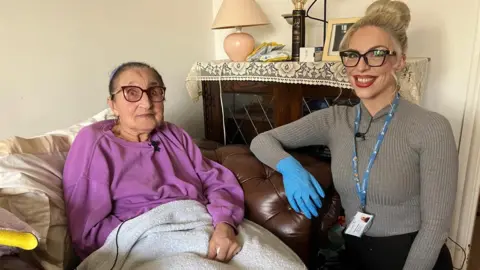Bosses said I'd lose visa if I complained - care worker
 Stephanie Miskin/BBC
Stephanie Miskin/BBCA migrant social care worker has said her employer threatened to cancel her visa if she complained about being forced to work long hours without any days off.
Sophia - not her real name - said she paid more than £2,000 in fees to a South Yorkshire care company that sponsored her visa to come to the UK from Zimbabwe to work for them in 2023.
The Home Office has cracked down on abuse and exploitation by some care companies by revoking their licences, leaving many workers without a job.
Leeds City Council, which oversees a Yorkshire-wide project to find new jobs for unemployed overseas workers, said there had been "challenges" in matching people with roles.
Sophia came to the UK on a health and care worker visa, designed to help plug staffing gaps in the sector.
She said she was placed in an unregistered, multi-occupancy house and when she complained that she was paying too much for the accommodation was told she was "not grateful".
Sophia added that she was threatened with having her Certificate of Sponsorship terminated - a document provided by an employer that is required for the visa to be valid.
"You're supposed to be quiet, so we had to suffer in silence," Sophia said. "You can't move, you can't breathe, you are stuck.
"You have sacrificed everything to come here so that you can start a new life. When you get here, you see the treatment is not good."
Sophia said she was often out of the house for 16 hours a day for work, without any days off.
She felt unable to seek any other employment because her visa depended on the care company.
'Safety net'
The union Unison has called for the government to take control of issuing Certificates of Sponsorship, to stop individual care companies having "an enormous amount of power" over workers.
Jordan Stapleton, the union's regional migrant lead, said: "We're seeing migrant workers who are having to pay thousands of pounds in illegal fees, often working 16 hours a day, often without a break, not getting paid correctly, not being paid for travel time and being threatened with deportation and their visa being removed if they complain.
"Although the government has been revoking the licence of some of these employers, many employers are still operating because [employees] daren't report them."
Jamila Duncan-Bosu, a solicitor from the charity Anti Trafficking and Labour Exploitation Unit (Atleu), said she had seen a rise in the number of inquiries from care workers seeking legal action over their experiences.
"There needs to be a proper safety net," she said.
Between July 2022 and December 2024, the government said it had revoked more than 470 care providers' licences, which enable companies to give visas to overseas workers across England, where there were concerns about abuse and exploitation.
But the move had left thousands of the workers unemployed.
Home Office figures released last month revealed more than 39,000 workers had been associated with these care providers since October 2022.
To help find the workers find new jobs, in March 2023, the then-Conservative government gave councils across England a total of £16m to tackle the exploitation of overseas workers, help find them new work and offer support.
Leeds City Council runs the Yorkshire and Humber branch of the project.
The project said it had been approached by 4,355 workers who had been left without employment after having their visa sponsorships revoked.
It had successfully matched 71 people to new roles or new sponsors since it launched two years ago.
A council spokesperson said a lack of Home Office-approved sponsor organisations in the area affected the number of job matches.
"We recognise that there have been challenges across the region in finding workers new sponsors, which is in line with national recruitment issues faced by organisations in the care sector across the UK," they said.
A government spokesperson said they were "determined to protect migrant care workers from exploitation and abuse," including from employers that fail to provide work they had promised or non-payment of minimum wage.
"Where there is evidence of illegal and unethical practices, we will always take action as swiftly as possible," they said.
 Stephanie Miskin/BBC
Stephanie Miskin/BBCDan Archer, chief executive of home care service Visiting Angels, which has no involvement with Sophia's case, said his company had chosen not to hire staff through the visa scheme.
He said in some cases hiring overseas workers was "the wrong solution" to fix the staffing shortage.
"It feels exploitative, bringing people to the UK to ask them to do a job that not enough people in the UK are prepared to do," he said.
Instead, Mr Archer said the company aimed to make the job more attractive to workers already in the UK, by offering better pay and avoiding zero-hour contracts.
Elaine Thompson, from Thurnscoe, near Barnsley, said she had relied on the firm's care since her husband died five years ago.
Her carer, mother-of-three Natalie Henstalk, said she enjoyed the job because she felt she was helping people and flexible hours meant she could also look after her children.
"I love my job. It's a good job to have," she said.
